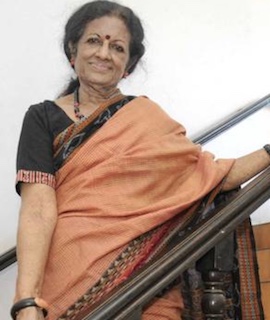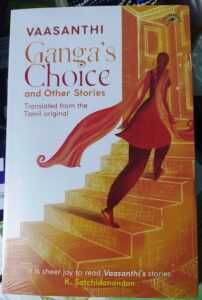“Media Has Changed Now And There Are Too Much Pressures On Journalists Now”- Author Vaasanthi


Vaasanthi is an Indian journalist and writer. She also wrote the biography of J. Jayalalithaa in 2016 and a biography of M. Karunanidhi titled Karunanidhi: The Definitive Biography She has written around 40 novels and six short story collections. Her new short story collection Ganga’s Choice and Other Stories is out now. The Kolkata Mail correspondent Priyanka Dutta caught up with the author in an exclusive chat over her new book. Excerpts..
You have written six short story collections already. What can the readers expect from Ganga’s Choice and Other Stories?
Vaasanthi- Those six collections were in the original Tamil, the language in which I write fiction. This collection, translated into English, is 15 chosen stories that I consider to be among the best of them. This is the second collection in English translation. This book, Ganga’s choice and other stories introduce the readers to characters on the margins; meet them in moments of desperation, in situations that call into question their convictions. These are characters you encounter in everyday life and yet fail to notice. The underlining theme is about social/communal/ political injustice, about the body, sexuality, the patriarchy.
Do you believe that the common people have the power to bring about changes in our society?
Vaasanthi– World history tells us there have been examples from the time of signing of The Magna Carta in 13th century England, of many ways people power can change the world – from boycotts, protests, workplace action, to political campaigns. The recent examples were ‘Me Too’ agitation, ‘Black Lives Matter’ that resulted in a change in perspectives all over the world, regarding gender and race -and very recently at our own shore- the farmers protest that went on for more than a year by ordinary men and women, that astonishingly made a government considered to be unbending to relent and take back the laws it had passed.
You penned down the biographies of Jayalalithaa and M. Karunanidhi. How was the experience of writing on such dynamic political personalities?
Vaasanthi- Very tough. It involves a lot of research work and reading, travel, and interviewing people who can shed some light on the subjects.
Jayalalithaa’s book was very difficult because people who had worked for her were still very afraid of divulging any views on her or material concerning her to me. She refused to give an interview to me and when the book was about to be released, she went to court and brought an injunction against its release. The book ‘Lone Empress’ was published [Penguin] updated, only after her death.
Karunanidhi’s book was comparatively easy. There was a lot of material, his own autobiography, available for references. Apart from these I personally knew him well having met him several times to interview him for the India Today Tamil edition of which I was the editor for nine years.
You have worked as the editor for the Tamil edition of India Today. How has journalism changed over the years?
Vaasanthi- It has changed, sadly. There seems to be a lot of political pressure over the media these days. Journalists are afraid to speak /write against the establishment. The few who do are getting punished in ways we had not heard of before. Many journalists who have domestic commitments, who depend on their jobs, prefer to tread the safe path. Non-committal. When I was working in the nineties in Chennai, there was no pressure from either Jayalalithaa or Karunanidhi when Tamil Nadu was under their rule respectively, though I was fearlessly critical of them.
Do you have plans of writing another biography of a famous personality? Whose biography would you love to write?
Vaasanthi- I have no plans to write another biography. After Karunanidhi’s book, I wrote the biography of Super Star Rajinikanth. All the biographies that I have written were written not because I desired to write them. I was assigned by publishers like Penguin, Juggernaut, and Aleph to write.
